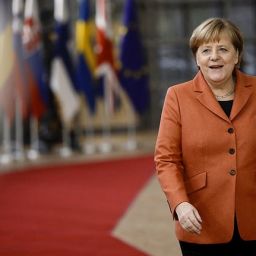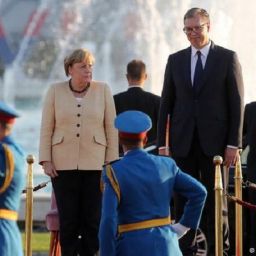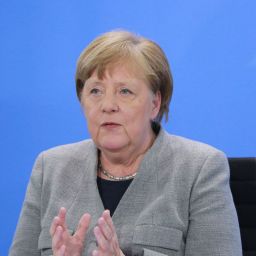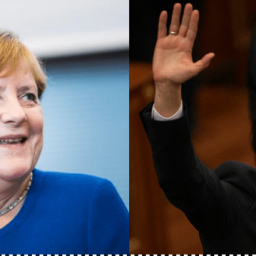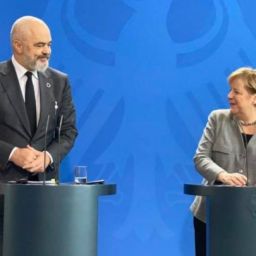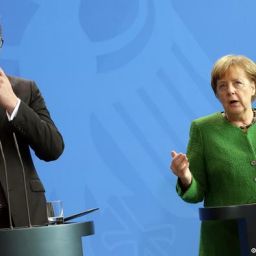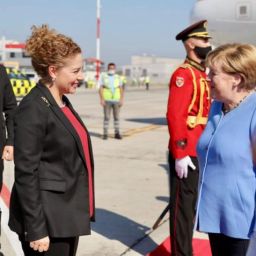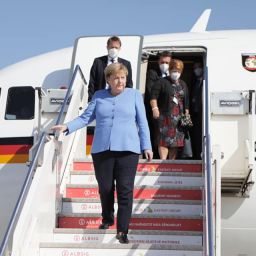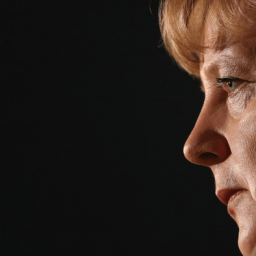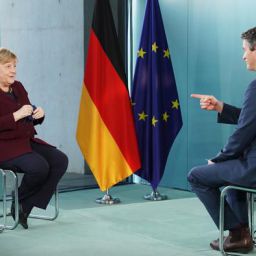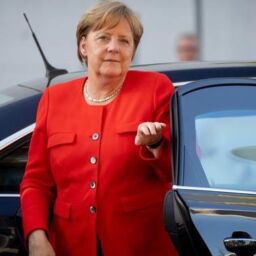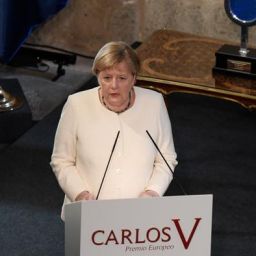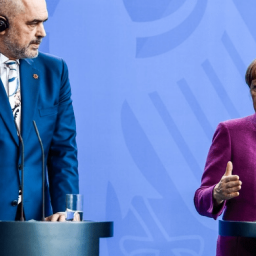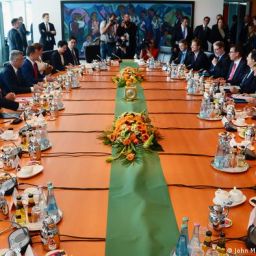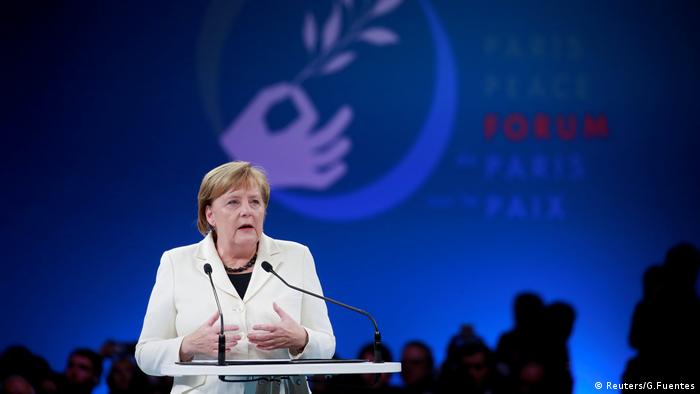
Angela Merkel leaves the post of chancellor next week. Europe will miss the tireless architect of balances and compromises, writes Auron Dodi.
The German Armed Forces on Thursday (02.12.2021) greeted Angela Merkel with the highest German military rating for civilians: with a military parade. Soldiers with torches in their hands and a band of music performed a farewell ritual, according to a meticulous choreography established as early as 1838. In the end, the soldiers removed their helmets in honor of Merkel.
The Chancellor attended the ceremony occasionally in tears. Cameras showed the chancellor with tears in her eyes as she listened to her three musical wishes for the ceremony: first the famous German Democratic Republic’s 1974 hit “Du hast den Farbfilm vergessen” (“You forgot the color film”). of punk singer Nina Hagen, followed by the song “Für mich soll es rote Rosen regnen” (“For me let the rain fall red roses”), by the singer Hildegard Knef. Protestant, was an 18th-century church hymn: “Großer Gott, wir loben Dich” (“Holy God, we praise your name”).
In front of about 50 of her former ministers present and over 150 other guests, Merkel gave a short speech. She said she felt “gratitude and humility” for the post she had held for so long.
Given the financial crisis of 2008, the refugee crisis of 2015 and the current pandemic, Merkel stressed Germany’s strong dependence on cooperation across national borders as well as the value of multilateral institutions.
Merkel, “die Mutter” (mother), as she is called in Germany, continued her speech with a message of psychological and spiritual care for Germans. She urged her citizens to believe in the facts, to show willingness to understand the views of others, and to do things with joy and heart. She was instructed by the Germans to approach the tasks before them not with “negativity and goodwill”, but with “joy in the heart”, as she herself had done in the GDR.
“It is this joy in my heart that I wish for all of us, and figuratively for our country, even in the future,” Merkel concluded.
Merkel’s unusual popularity
A few days before leaving the post of chancellor, which she held for 16 years, Angela Merkel has a phenomenal support in the public. Support for him even today is over 50%.
Germany’s two other long-serving chancellors, Konrad Adenauer and Helmut Kohli, were less fortunate. Adenauer was ousted from office, and his power was shaken by the abusive behavior of his ministers in the Der Spiegel affair. Helmut Kohli ran for a fifth term and lost the election.
And Angela Merkel could have won if she had run again. She is the first German chancellor to step down voluntarily.
Economically , Merkel is leaving Germany much richer than she found when she came to power. In the 16 years of its rule, Germany’s Gross Domestic Product grew by about 50%. Unemployment has almost halved.
Germany’s prosperity and increased power have increased Germany’s prestige in the world , as polls by European organizations have found.
Mistress of power and success reference
Merkel has consistently polarized the people far less than her predecessors.
Politically , Merkel shifted her party, the CDU, to the center, not to political extremes, as parties tend to do today. This made the CDU acceptable to the broad masses of the people. Despite criticism of the party’s conservative character, this gave the CDU four consecutive terms at the helm of Germany.
Merkel is not stepping down, due to some CDU revolt against her, a phenomenon typical of other long-standing leaders. She neutralized her critics in time and made them leave the race. The handover of the post of CDU chairwoman and the holding of only the post of chancellor, an innovation in the CDU, further reduced the pressure on her.
In the last parliamentary elections, Merkel was the main point of reference for success even for the opposition. The next Social Democrat chancellor, Olaf Scholz, did not win the election with criticism for Merkel, but as a candidate for the continuation of her prudence and pragmatism.
For the tasks of the future, in the September parliamentary elections, German voters saw fit again a coalition of the center, the SPD, the Greens and the FDP. This speaks to what the middle of society has generally maintained soundly during Angela Merkel’s rule.
At the same time, the change of power and management staff with these parliamentary elections came at the right time. Times have changed and the many tasks that Germany has before it, such as climate, digitalization, emigration, benefit from new beginnings.
Merkel’s unique political style
A role for Merkel’s popularity and success has been played by her unique leadership style.
Angela Merkel has so far stayed away from arrogance or loss in self-satisfaction. She has run arrogantly and without interest in public staging. Merkel has remained fully committed to the task, focusing on concrete problems, paying attention to detail.
In contact with people, Angela Merkel has always shown respect for the person in front, regardless of the position of the other. After such a human contact with her, there were quite a few people in Germany, previously uninterested, who voted for her party, the CDU.
This new political style is a valuable legacy left behind by Angela Merkel.
Compromise Architects, Crisis Management: Highlights
In the 16 years of Merkel’s rule, Europe and Germany have gone through several crises. Merkel has shown great skills in managing all crises. European citizens expressed their gratitude for this in a recent European poll, where they wanted Merkel to become “president of Europe” .
The refugee crisis is undoubtedly the culmination of its mandate. On September 4 and 5, 2015, Merkel decided to accept the entry into Germany of about 800,000 refugees, originally mainly from Syria. In a telephone conversation, Austrian Chancellor Werner Faymann begged Merkel to accept some groups of refugees who had been deported from Hungary and were heading to Austria. The alternative was a request to Hungarian Prime Minister Orban to forcibly detain refugees.
After coordinating with close associates and political party leaders, it was agreed to make “an exception” as the Social Democrats said, a “humanitarian” gesture, as Merkel said.
This gesture was appreciated in the world. Former British Prime Minister Tony Blair has described it as an act “that came from a spirit of compassion”. Merkel’s biographer Ralph Bollmann calls this night “historic night” in his latest biography for Merkel.
The reception of refugees was initially welcomed by most people in Germany. At a press conference on August 31, 2015, Merkel encouraged the Germans, saying: “We will succeed, and where something stands in our way, we must overcome it …”
But the enormous number of new arrivals led to a drop in initial enthusiastic support for refugees in Germany. Merkel’s attempts at refugee quota sharing in the EU failed.
Germany entered the biggest political and social crisis of Merkel’s mandates. The reception of refugees had political implications: in Germany the ultra-right anti-refugee party “Alternative for Germany” was born.
Merkel has so far defended hospitality for refugees. She has said that under the same circumstances she would take the same step she did. In an interview with Deutsche Welle last month, Merkel concluded: “Yes, we have succeeded.” succeed in combating the causes of migration. “We have not succeeded in getting Europe to have a unified system of asylum and migration.”
Historical acceptance of common debts by the EU
The second culmination of its mandate is the approval of the EU 750 750 billion pandemic Reconstruction Fund . On this occasion, Germany accepted for the first time a form of Eurobonds. This reconstruction fund will be financed with common debts, which will be taken by the European Union, to give as grants, not only as loans, to the countries in need.
In an interview with European newspapers in June 2020, Merkel said that “it is in Germany’s interest that the European Union does not collapse.”
At this time, with her extraordinary sense of tectonic movements in the public eye, Merkel had recorded the persistent calls of the German economy and experts, to save countries at risk of collapse from new debts dictated by the pandemic, e.g. Italy or Spain.
For the Reconstruction Fund, Merkel initially agreed with French President Emmanuel Macron on May 18, 2020. It was agreed to make 500 billion euros available to countries in need . In June 2020 this amount was increased by the European Commission to 750 billion euros.
Merkel called the fund “a special response to a particular situation.” Despite the limitation in the words of the declaration, the southern European states appreciated the profound change in Germany’s position. French President Emmanuel Macron said that with her method, Merkel strongly linked Germany with Europe.
***
Angela Merkel has a safe place in history, given only the duration of her power. Only Otto von Bismarck and Helmut Kohl have ruled longer than her (Kohl even just a few more days).
Bismarck united the German states in the German Empire, Kohl reunited divided Germany.
Merkel shaped today’s modern Germany. In its ouster, Germany has become not only Europe’s dominant economic power, but also one of the most valued and preferred countries in the world. Merkel masterfully managed to balance the national interests of Germany with the project for the development of Europe.
Even in relations with Russia, Merkel never forgot the great potential of this state to influence the world. Common economic interests for Merkel were a factor in maintaining bilateral dialogue. Without Germany, it would have been impossible to continue EU sanctions against Russia.
Former British Prime Minister Tony Blair has recently called in the British media “a dominant part of Merkel’s political psyche” her ability to “distinguish compromises and navigate the political challenge with maximum attention to practical solutions, as a force and not as a weakness ”.
Not only Tony Blair will miss the “genuine anti-populist, in character and politics.” On a recent visit to Washington in July 2021, President Joe Biden thanked Merkel for her “strong, principled leadership” career. He told Merkel that “you never forgot to defend human dignity.”
Angela Merkel will also miss the Balkans, whose enlargement agenda she has kept active at European tables in the last decade. It will lack the communication between East and West, for which Merkel was predestined also because of her origin from East Germany.
While Germany will remember the Merkel era, its ability to manage crises and the well-being of this time, as one of the golden ages./DW









